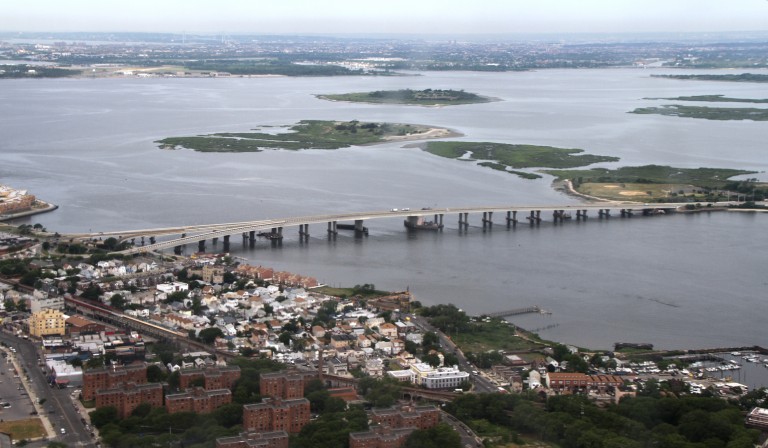PHOTO: Elected state officials have secured a five-year extension to landmark legislation preventing the dumping of toxic materials into Jamaica Bay. Courtesy of Wikimedia Commons/Bjoertvedt
By Forum Staff
Two elected state officials this week heaped praise on both houses of government following unanimous votes in the Senate and Assembly in favor of a five-year extension to landmark legislation preventing the dumping of toxic materials into Jamaica Bay.
“As a member of the Senate Environmental Conservation Committee, I believe Jamaica Bay is a critical natural resource and an environmental jewel that needs to be carefully protected. I am pleased that we have passed this legislation ensuring that existing environmental safeguards for the bay will remain in place for at least another six years,” said State Sen. Joe Addabbo, Jr. (D-Howard Beach), who worked with Assemblyman Phil Goldfeder (D-Howard Beach) on the bill. “We need to remain vigilant to ensure that our beautiful bay isn’t allowed to become a dumping ground for harmful pollutants.
Last Thursday, lawmakers in both chambers approved a bill to create a five-year extension to legislation prohibiting the dumping of toxic materials into the borrow pits – areas of deeper water depths in the bay created by projects that excavated, or “borrowed,” seabed sediments for use in other areas – under the bay. This extends through 2022 language in state Environmental Conservation Law requiring permits for filling borrow pits with materials generated by dredging projects in area waterways. Under this restriction, Goldfeder and Addabbo said, the sediments must also meet the State Department of Environmental Conservation’s Class A criteria for chemical contamination, the state’s highest sediment classification.
The DEC spells out sediment classification in its Technical and Operational Guidance Series, a compendium of regulatory and enforcement mechanisms aimed at protecting New York water quality in the state’s lakes, rivers and coastlines. The TOGS classifies sediment by Classes A through C based on the levels of chemicals and heavy metals present, with Class A indicating “no toxicity to aquatic life,” while Class C confirms “acute toxicity to aquatic life.”
The Class A requirement in Goldfeder and Addabbo’s bill would provide the highest level of environmental protection to the bay and surrounding habitats.
“Jamaica Bay is a vital resource for the entire community. It supports so much of the recreational and economic activity that benefits thousands of families across southern Queens and Rockaway. It is also critical habitat for our fragile coastal ecosystem and we have a responsibility to preserve and protect it,” said Goldfeder. “Extending the ban on dumping toxic materials into the Jamaica Bay borrow pits will ensure that we continue to maintain this special place now and for future generations.”
According to Goldfeder and Addabbo, the future of the bay’s borrow pits has long been a point of contention between state and federal officials and area residents and environmental activists.
The largest and deepest borrow pit is directly adjacent to John F. Kennedy International Airport, which supplied landfill for expansion projects at the transit hub. Borrow pits have also been created for the construction of Floyd Bennett Field and other public works.
In the mid-1980s, the legislators said, the U.S. Army Corps of Engineers proposed filling the borrow pits with sediment generated by dredging in New York Harbor. According to the southern Queens environmentalist group Jamaica Bay Ecowatchers, the proposal was an effort on the part of the government to dispose of sediments deemed too toxic under federal guidelines for dumping in the ocean. The waters around Jamaica Bay form part of the National Park Service’s Gateway Recreational Area, and fall under the jurisdiction of the DEC.
Four years ago, Goldfeder and Addabbo partnered with the Ecowatchers to introduce legislation banning the dumping of the toxic materials into the bay. Gov. Andrew Cuomo signed the bill into law in 2014—however the language included a June 30, 2017, expiration date, leading to this most recent extension proposal.
“The Jamaica Bay Ecowatchers commend Assemblyman Goldfeder and Senator Addabbo for passing this critical legislation and we urge to Gov. Cuomo to sign it,” said Ecowatchers President Dan Mundy, Jr. “It is fitting that the assemblyman’s last bill before leaving office will provide long-term protection for this community and environment and put a halt to a horrible plan which was driven purely by economics. Assemblyman Goldfeder is going out the way that he has served his constituents from Day One, which is fighting the good fight looking out for the families he served and protecting beautiful areas like Jamaica Bay for generations to come. Environmental groups around the bay applaud Assemblyman Goldfeder and State Senator Joseph Addabbo’s efforts to get this bill passed.”
In his statement, Mundy referenced Goldfeder’s recent announcement that he will not run for a fourth term. His current term ends on Dec. 31. Goldfeder has endorsed Stacey Pheffer Amato in the general election.
“It has been a pleasure to work with Assemblyman Phil Goldfeder in protecting the delicate ecology of Jamaica Bay, which includes unique salt marshes, and taking action to prevent any environmental degradation that may result in a loss of wildlife habitat, compromised water quality and other negative consequences for the area,” Addabbo said.
For now, the assemblyman and the senator are basking in what they have called “an eleventh hour victory” – both houses unanimously voted in favor of the bill during the evening of the last scheduled day of session for the year (later extended into Friday).

